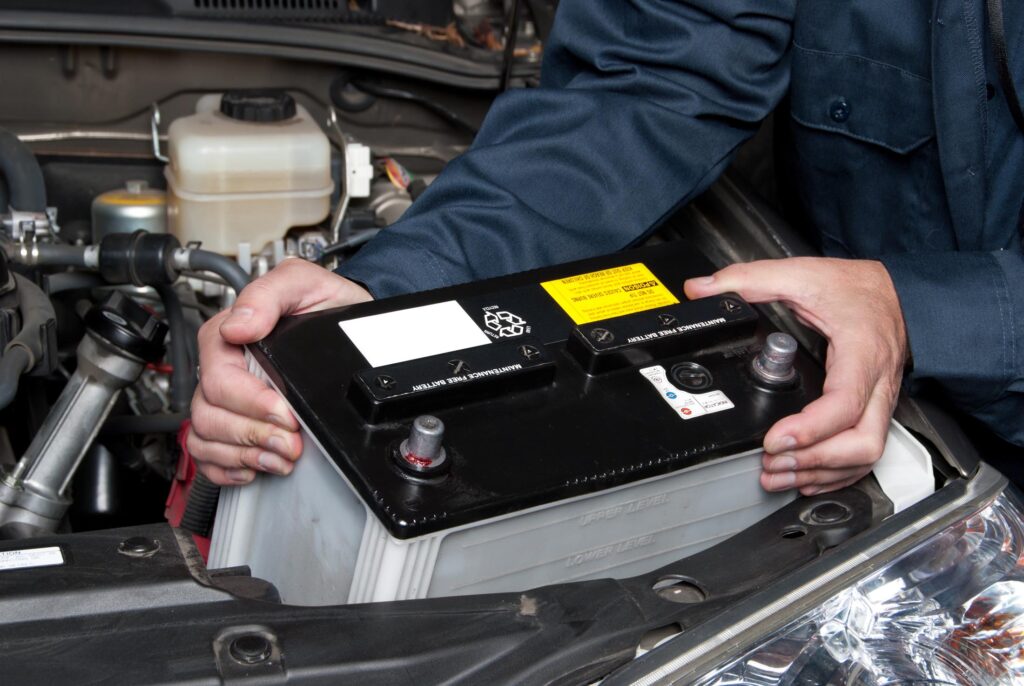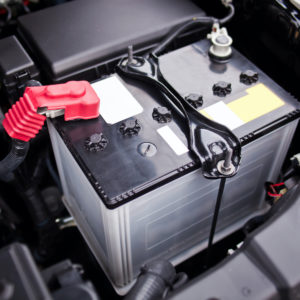There’s nothing more frustrating than having a dead car battery while you’re running late. If you’re wondering what can drain your car battery overnight, here are the possible culprits:
- Lights in the car were left on
- Parasitic draw from accessories
- Extreme temperatures and weather
- Damaged battery connections
- Damaged alternator
- Too many short drives
- Old battery
The great news is that you can prevent them and keep your battery ready to power your ride.
What Causes a Car Battery To Drain Overnight?

There are many reasons a car battery loses charge overnight. Not all of them are obvious, but most are preventable.
Lights Left On
While newer vehicle models will turn the lights off automatically, older units don’t have this feature. If your ride falls in the latter category, failing to switch the lights off after exiting can potentially waste a lot of battery power.
Illuminated headlights drain energy quickly, however, leaving your interior light on will lead to the same problem. If your vehicle is malfunctioning, it could struggle to register when a car door has been closed, resulting in the interior light staying on overnight.
Lights that are left on overnight will drain the car’s battery until there’s no power left.
How to Prevent
Give your vehicle a look-over after closing its doors. Just a quick check to make sure all the lights are off can save you a lot of power. It’s a good habit to develop since you can improve the overall longevity of your car by minimizing battery drain.
Most newer vehicles make checking over them a lot easier. Some have alert systems that let drivers know if they’ve left any part of the car on.
Parasitic Draw From Accessories
Lights aren’t the only parts that drain power. Essential dashboard parts like the clock, radio, and sound system all drain energy from the car battery.
This normally wouldn’t be a problem because cars tend to charge their batteries whenever they’re in motion.
However, a damaged relay could cause cars to use up power even when the vehicle is parked and the engine is off. This parasitic draw can drain the battery if left unresolved.
How to Prevent
Keeping an eye out for any accessories that are still active after shutting the door can increase your car battery’s longevity. Don’t leave things like chargers and other plugged accessories, as they’ll continuously drain power from the battery even if your car isn’t running. Unplug and remove them before leaving your vehicle.

Extreme Temperatures
Older car batteries are sensitive to sharp changes in temperature. Whether it’s due to the severe heat or the cold, you might notice performance issues with your car battery in extreme temperatures.
Fortunately, newer batteries are more resistant to weather conditions.
How to Prevent
Protect your car from the elements. Blanketing your vehicle with a car cover could work for sedans and SUVs, but your best bet would be to park it in your garage. Garages are perfect for keeping your vehicle out of extreme temperatures and inclement weather.
Damaged Battery Connections
If your car battery keeps draining overnight, the battery connections could be either loose or damaged. Sometimes the positive and negative terminals connected to the car battery corrode or come loose, making it difficult for the battery to transmit power.
How to Prevent
If your car battery is already damaged, your best bet would be to replace it with a new one. Driving with damaged battery connections is dangerous because you run the risk of stalling out in the middle of the road. You could also put your vehicle’s electric components in jeopardy.
Damaged Alternator
The alternator is responsible for charging the car battery while you drive. So if it takes any damage, it might affect the output of energy, leaving the battery with less power to work with.
If your vehicle consumes more electricity than it generates, your car battery will inevitably drain and run out of power. On average, an alternator should generate 13.5 to 14.5 volts. If your alternator is underperforming, it could be responsible for your drained battery.
How to Prevent
Like with most car parts, proper maintenance is key, so regularly check on your alternator. If it’s old or too damaged, it might be time to replace it.
Make sure to double-check it for any damage in the diodes as well. An alternator with damaged diodes is going to gradually lose power as electricity leaks—even when the car is off.
Frequent Short Drives

Though the alternator generates energy for your car battery while you drive, it takes time to do so. This means short drives can cause you to waste a lot of power. The power used up starting the car will eventually overtake the power generated by the alternator.
In addition, short trips put tremendous strain on your car’s battery. In other words, making short trips too frequently can shorten the lifespan of your car battery.
How to Prevent
If you have to use your vehicle for a short time, you can leave it running. Letting it run for even 10 minutes can help improve the overall longevity of your battery, preventing it from draining itself overnight.
Old Battery
If your car battery loses charge overnight, it could be a sign that it’s on its last legs.
Bear in mind that some car batteries can expire earlier than anticipated due to harsh weather conditions, extreme temperatures, and bad driving habits.
How to Prevent
On average, a car battery lasts 4-5 years. If the one in your vehicle is older than that, it might be time to consider getting a replacement. Driving with an old battery isn’t dangerous, but it is incredibly inconvenient.
Leaving Your Car Parked Too Long
A car that’s been sitting in the garage for too long can lead to a dead battery. In most modern vehicles, electronic systems continue to use power even when the engine is off. This is why your car might refuse to start after leaving it parked for a few weeks.
How To Prevent
A brief 15-minute drive every week should be enough to help maintain your car battery’s state of charge. This also helps keep the alternator and electronic systems in good condition.
Be sure to drive for at least 15 minutes because quick drives can also harm your car battery.
How Do You Diagnose What Is Draining Your Car Battery?
With so many possible causes, figuring out why your car battery keeps dying can take some time. Here are some tips on how to diagnose what’s draining your car battery:
- Check if you left any of your interior lights, trunk lights, and other electrical systems turned on after you exited your vehicle.
- To check for parasitic drain, start with a fully charged battery before disconnecting the negative terminal of your car battery. This ensures you have a clean slate and will prevent any power from being drawn while testing.
- Follow your manufacturer’s guidelines regarding battery testing. Make sure to set your multimeter according to its specifications.
- If your multimeter shows that there is a parasitic drain, you’ll have to remove one fuse at a time while checking the multimeter for any changes. If your multimeter doesn’t detect a parasitic drain in your vehicle, then it might be time to ask a mechanic for help.
Any information provided on this Website is for informational purposes only and is not intended to replace consultation with a professional mechanic. The accuracy and timeliness of the information may change from the time of publication.






























